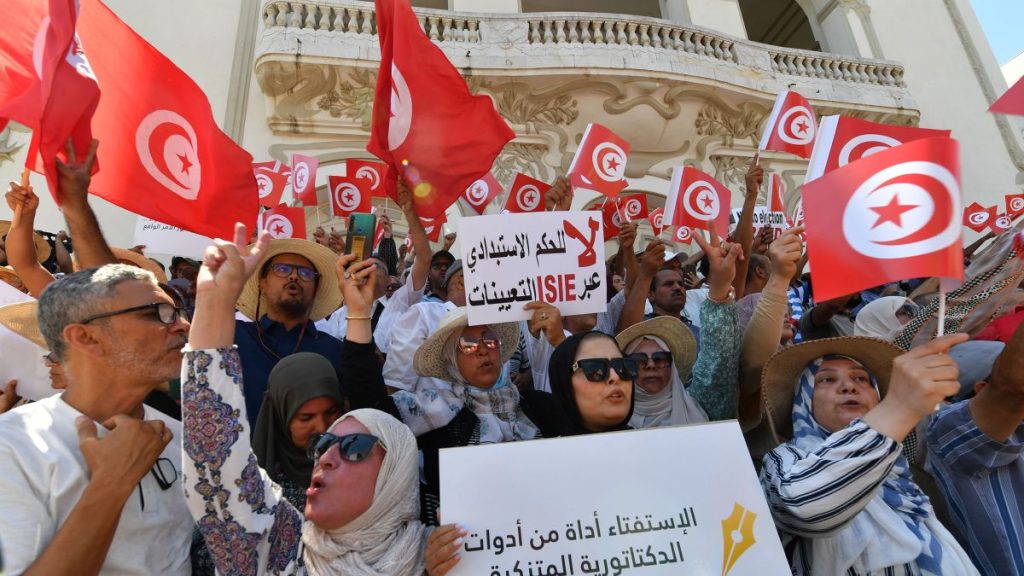The last ‘Arab Spring’ democracy is dangling by a thread

Polls opened early on Monday and are due to stay open until late. It is unclear when the results will be announced, but many expect the landmark vote to pass, since there is no minimum voter threshold. Analysts say that, if it passes, Monday’s referendum will be the final blow to the social and political gains made by the North African country since the Arab Spring, setting the country on a path that will be difficult to return from. “We will establish a new republic that is different from the one we have had over the last ten years,” Tunisian President Kais Saied Saied has defended his decrees, saying they are driven by a need to “correct the course of the revolution” and to rid the country of corruption. Among Saied’s targets was the moderate Islamist Ennahda party, whose leader Rached Ghannouchi remains under investigation for money laundering (Ghannouchi denies the allegations, which he has denounced as politically motivated). Ennahda, a major political player in the country since the Arab Spring, has recently come under criticism for its central roles in Tunisia’s years of economic and political crisis. Some initially celebrated the decision, with huge crowds gathering in his support in Tunis and other cities, but the opposition has called Saied’s move a coup. Analysts say the new constitution would eliminate the last structure remaining from the country’s days of democracy. Tunisia’s 2014 constitution was “the crowning achievement of Tunisia’s democratic era,” said Monica Marks, professor of Middle East politics at New York University Abu Dhabi, adding that it represented the hard work done in the “post-2011 political transition away from dictatorship.” In May, Saied appointed a “National Consultative Commission for a New Republic,” and tasked it with drafting a new constitution — to be voted on in today’s referendum. Published in the state gazette on June 30, the draft constitution alarmed activists and rights watchdogs, who say it limits the influence of parliament and essentially signs off on one-man rule. “There is no meaningful separation of powers,” Marks told CNN. “There is no oversight between branches of government and there is no presidential accountability,” she added. Among the constitutional features that concern critics are articles which set out that the government answers to the president, that the president appoints the head of government, and that the president can — at any point — dismiss the government or its members. The draft constitution also makes it harder for parliament to pass a no-confidence vote in the government. While rights and freedoms are promised protection, as under the existing constitution, an array of other issues are sounding alarm bells. The lack of balance of power and the “absence of checks and balances” in the new draft constitution are a great worry, according to Aymen Bessalah, programs coordinator for Human Rights at Al Bawsala, a non-profit organization founded in 2011 by Tunisian activists. “These are similarities to the 1959 constitution,” Bessalah told CNN, referring to a previous version that granted sweeping powers to the president. “He has large and powerful executive powers, and judicial independence is not guaranteed,” Bessalah added. Other articles grant the president executive authority to appoint senior officials, both civil and military, to take “exceptional measures” in the case of dangers to national security, and to rule by decree until a newly-elected parliament takes office. While an amended draft of the new constitution was published on July 8, it only included minor changes and kept the president’s proposed powers in place, analysts say. Several political parties have already rejected the July 25 referendum, and Tunisia’s powerful labor union (UGGT), an influential group with more than a million members, branded Saied’s constitution a threat to democracy but said it would allow its members to vote. “The proposed draft dismantles many of the safeguards provided in Tunisia’s post-revolution constitution and fails to provide institutional guarantees for human rights,” said Heba Morayef, Amnesty International’s regional director for the Middle East and North Africa, adding that it sends “a chilling message” and sets Tunisian efforts back by years. Tunisian authorities did not respond to CNN’s request for comment on either the draft constitution or the government’s plans to safeguard freedoms and rights should the referendum pass. A series of protests and strikes took place in the capital Tunis ahead of Monday’s referendum. “This hyper-presidential system is a step back and will be difficult to recover from, at least on the short-term,” said Bessalah, adding that once the new constitution is approved — as many expect it will be — a crackdown on freedoms is likely to follow. “[The referendum] is one extremely important event in a long, continuous process of Kais Saied’s dictatorial consolidation,” said Marks. “That’s the real reason why it is terrifying.” The digest Russia’s Lavrov visits Egypt, reassures Cairo of continued Russian grain supplies Russia’s Foreign Minister Sergei Lavrov visited Egypt on Sunday, where he reassured the North African country of continued Russian grain supplies. Background: “We reaffirmed the commitment of Russian grain exporters to meet all their commitments,” Lavrov said in a press conference with Egyptian counterpart Sameh Shukri, Reuters reported. Last week, Ukraine and Russia agreed on a deal that would allow the resumption of grain exports from Ukraine’s Black Sea ports, which Russia has been blockading since the start of the war. But uncertainty remains — less than 24 hours after the deal was signed, two sea-launched Russian Kalibr cruise missiles slammed into the harbor in Odesa. Why it matters: One of the world’s top wheat importers, Egypt bought 80% of its wheat from Russia and Ukraine last year. Egypt has continued to buy wheat from Russia during the war, but it has been impacted by rising prices and global disruption. In an effort to make up for some shortages, Egypt has sought to buy grain from other sources and capped bread prices at home. Israel’s Lapid warns against move to dissolve Russian branch of Jewish AgencyIsrael’s Prime Minister Yair Lapid on Sunday said that Russia’s move to dissolve the local branch of the Jewish Agency, a non-profit organization that promotes and helps Jews emigrate to Israel, would be a serious development affecting relations between the two countries. Background: Russia’s Justice Ministry requested the dissolution of the Russian office of the Jerusalem-based Agency earlier this month and a court hearing is set to take place on Thursday. The Ministry has not given details of why it is seeking the move, but it comes just a few weeks after Lapid replaced Naftali Bennett as Israeli premier. In his previous position of Foreign Minister, Lapid had been one of the most outspoken Israeli leaders in criticizing Russia’s invasion of Ukraine. Why it matters: In a possible sign the Kremlin might be unwilling to listen to Israel’s concerns, by Sunday evening Russia was yet to approve an Israeli government request to send a team to Moscow for talks on the issue. In addition, Israel will be wary of upsetting Russia too much because it needs Moscow’s tacit approval to keep striking Iranian targets in Syria. Iran carries out first public execution in two years Iran publicly executed a 28-year-old man on Saturday, its first in two years, according to the Norway-based Iran Human Rights group (IHRNGO). Iman Sabzikar was convicted of killing a police officer in February 2022 in the southern city of Shiraz, state news agency IRNA reported. Background: Sabzikar’s sentence was upheld by Iran’s Supreme Court Saturday morning, IRNA said. His was the first public execution in Iran since the start of the Covid-19 pandemic. Iranian authorities have executed at least 168 people in the first five months of 2022, an increase from the 110 people executed in the same time last year, IHRNGO reported in June. Why it matters: The IHRNGO denounced the practice as “medieval” and called for international condemnation. The human rights group called Sabzikar’s public execution a “brutal punishment … intended to scare and intimidate people from protesting.” What to watch The signing of a deal between Russia and Ukraine — mediated by Turkey and the UN — in Istanbul on Friday was a momentous event aimed at addressing global food shortages. The deal, if it sticks, would release millions of tons of trapped Ukrainian grain to global markets, much of which is desperately needed in the Middle East and Africa. “Today I feel I’m living probably the most important day of my tenure,” UN Secretary-General Antonio Guterres told CNN’s Becky Anderson Friday. Watch the report here: Around the region





